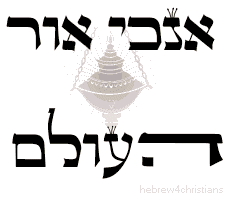|
There is a midrash about a dialog between Adam and the LORD God after Adam's banishment from the Garden of Eden. Adam feared that all humans would later blame him for their mortality, but God replied, "Don't worry about the others. From now on each soul will be responsible for giving account of his or her life. Each person is required to write his or her own 'Book of Life.' On the Day of Judgment, I simply ratify what has been written." Now while this is a midrash, there is a lesson here for us to heed...
We are all on a spiritual journey, writing the "Book of our Life." To help us in the "writing" process, the Jewish sages decided that the month of Elul should be set aside as a season for cheshbon hanefesh (ūŚųČū®ūüų░ūæų╝ūĢų╣ū¤ ūöųĘūĀų╝ųČūżųČū®ūü) - "making an account of the soul." This means that we engage in honest self-examination about our behavior. We take time to review our lives from the previous year. "How did I get to this place in my life?" "Where am I now?" "Am I where I should be?" We engage in this process of self-examination with an aim to grow -- to let go of the pain of the past and move forward.
We must begin by asking God for courage and strength... We must let go of the fear that we will discover the truth about who we really are -- about what we've done, what we've thought, about who we've allowed ourselves to become. Confession (ßĮü╬╝╬┐╬╗╬┐╬│ßĮĘ╬▒) means bringing yourself naked before the Divine Light to agree with the truth about who you are. Indeed, the word homologeo literally means "saying the same thing" - from ßĮü╬╝ŽīŽé (same) and ╬╗ßĮ╣╬│╬┐Žé (word). We need to confess the truth if we are to be free from the pain of the past. When King David wrote, "The LORD is my Light and my salvation; whom shall I fear? (Psalm 27:1), he implied that he should even be free of fear of himself and of his past....
ūÖų░ūöūĢųĖūö ūÉūĢų╣ū©ų┤ūÖ ūĢų░ūÖų┤ū®ūüų░ūóų┤ūÖ ū×ų┤ū×ų╝ų┤ūÖ ūÉų┤ūÖū©ųĖūÉ
ūÖų░ūöūĢųĖūö ū×ųĖūóūĢų╣ū¢ųŠūŚųĘūÖų╝ųĘūÖ ū×ų┤ū×ų╝ų┤ūÖ ūÉųČūżų░ūŚųĖūō
Adonai o┬Ęri ve┬Ęyish┬Ęi, mi┬Ęmi i┬Ęra?
Adonai ma'oz-chay┬Ęyai, mi┬Ęmi ef┬Ęchad?

"The LORD is my light and my salvation; whom shall I fear?
The LORD is the stronghold of my life; of whom shall I be afraid?" (Psalm 27:1)
Hebrew Study Card

As has been noted by various Jewish sages, different sins require different types of confession. Sins against God (i.e., bein Adam la-Makom: ūæų╝ųĄūÖū¤ ūÉųĖūōųĖūØ ū£ųĖū×ųĖū¦ūĢų╣ūØ) require confession to God alone for the sake of obtaining divine forgiveness. Sins against others (i.e., bein Adam l'chavero: ūæų╝ųĄūÖū¤ ūÉųĖūōųĖūØ ū£ų░ūŚų▓ūæųĄū©ūĢų╣) require that we personally acknowledge our harm to them and ask them for mechilah (ū×ų░ūŚų┤ūÖū£ųĖūö), forgiveness. Finally, sins against ourselves require that we admit that we have damaged our own lives and be willing to accept personal forgiveness. "For those whom we have wronged (including ourselves), may we be forgiven..."
It is important in this process not to blame others for our sins, since the object here is to work on changing ourselves, not others. As the Baal Shem Tov once said, "Sinners are like mirrors. When we see faults in others, we must understand that they only reflect the evil within ourselves." Of course this is not to say that you might not have been truly hurt by the actions and sins of others, but that is a matter of your own mechilah (forgiveness) to be given them if they come to you in teshuvah, not a matter of cheshbon hanefesh. The focus in this process is on our own sins -- and how we must respond to our own sinful condition. We cannot truly make amends with another if we are expecting a reciprocal act from them (e.g., "I've apologized to you, now it's your turn!")
Regarding self-forgiveness, it might be helpful to think about a sinful act you've repeatedly struggled with over the last year. Now imagine you are talking to a dear friend whom you deeply respect who is struggling this same way. How would you counsel him or her? Your answer can be part of the process of your own self-examination, where you can look within yourself honestly yet without the intent of bringing shame or further pain to your life. After all, the goal here is teshuvah -- return to God -- but you are not likely to do this if you are in a state of self-loathing or "toxic shame."
Most Christians are familiar with the idea of self-examination before partaking of the elements of the Lord's Table (i.e., the commemoration of Yeshua's last Passover Seder that prefigured His sacrifice as the Lamb of God who takes away the sins of the world). "Let a person examine himself first (╬┤╬┐╬║╬╣╬╝ßĮ▒╬ČŽē - test for authenticity), and then he may eat of the bread and drink from the cup" (1 Cor. 11:28). Now while it is assuredly true that we should examine ourselves before this ritual act, self-examination and confession should be part of our everyday lives as followers of the Messiah. The unexamined life -- especially as a follower of Messiah, God of Truth -- is not worth living, and the practice of suppressing the truth about our sinful condition can lead to self-deception and even death (1 Cor. 11:30). "If we say we have no sin, we deceive ourselves, and the truth is not in us; if we confess our sins, he is faithful and just to forgive us our sins and to cleanse us from all unrighteousness" (1 John 1:7-8). "Therefore, confess (ß╝É╬Š╬┐╬╝╬┐╬╗╬┐╬│ßĮ│Žē, lit. 'confess out') your sins to one another and pray for one another, that you may be healed" (James 5:16).
Ultimately, confession of the truth is not optional for anyone. For the follower of the Messiah, such confession produces salvation: "for with the mouth one confesses and is saved" (Rom. 10:10). But for those who refuse to undergo self-examination and confess the truth, there is the Lord's own reciprocal confession: "Then I will confess to them (ßĮü╬╝╬┐╬╗╬┐╬│ßĮĄŽāŽē ╬▒ßĮÉŽä╬┐ß┐¢Žé), 'I never knew you; depart from me, you workers of lawlessness' (Matt. 7:23).
There is a godly sorrow that works teshuvah within our hearts. This is a sorrow or a mourning (╬╗ßĮ╗ŽĆ╬Ę) -- not an exercise in self-contempt or false pride -- for the pain we have caused the LORD with our actions... "For godly grief produces a repentance that leads to salvation without regret, whereas worldly grief produces death" (2 Cor. 7:10). This kind of sorrow is ultimately healing, since it impels us to return to the source of Love and healing we so desperately need. May God all bless us with such sorrow, the "gift of tears."
|



